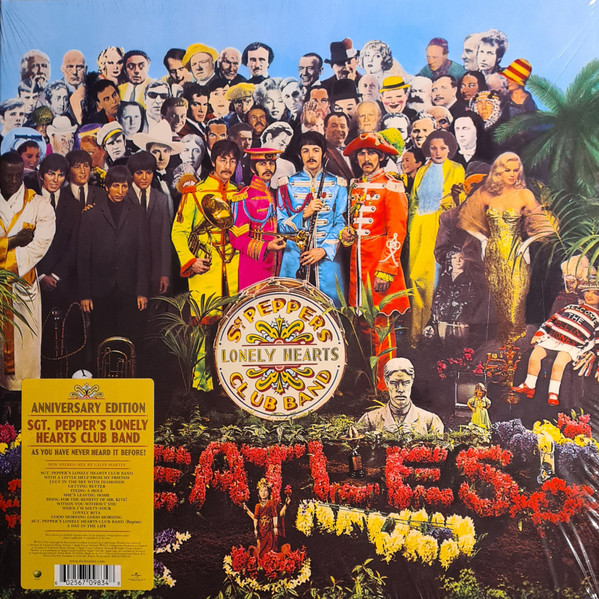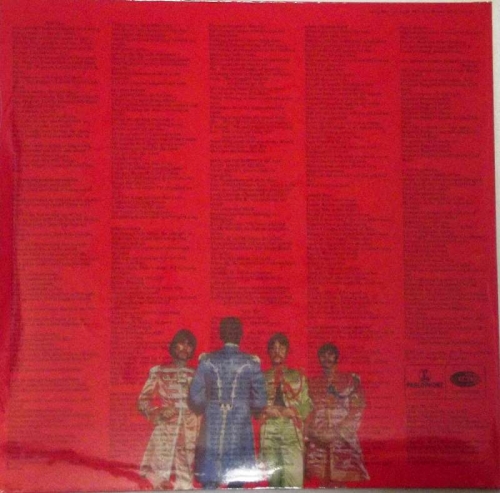

| Product Code: | 0602567098348 |
| Artist: | Beatles The |
| Origin: | UK, Europe & US |
| Label: | Parlophone (2017) |
| Format: | LP |
| Availability: | In Stock |
| Condition: |
Cover: M
Record: M
|
| Genre: | Pop , Rock N |
Brand new sealedl LP, Album, Special Edition, Stereo,.
Sgt. Pepper's Lonely Hearts Club Band is the eighth studio album by the English rock band the Beatles. Released on 26 May 1967,[nb 1] Sgt. Pepper is regarded by musicologists as an early concept album that advanced the roles of sound composition, extended form, psychedelic imagery, record sleeves, and the producer in popular music. The album had an immediate cross-generational impact and was associated with numerous touchstones of the era's youth culture, such as fashion, drugs, mysticism, and a sense of optimism and empowerment. Sgt. Pepper received widespread critical acclaim for its innovations in songwriting, production and graphic design, for bridging a cultural divide between popular music and high art, and for reflecting the interests of contemporary youth and the counterculture.
At the end of August 1966, the Beatles had permanently retired from touring and pursued individual interests for the next three months. During a return flight to London in November, Paul McCartney had an idea for a song involving an Edwardian military band that formed the impetus of the Sgt. Pepper concept. For this project, they continued the technological experimentation marked by their previous album, Revolver (1966), this time without an absolute deadline for completion. Sessions began on 24 November at EMI Studios with compositions inspired by the Beatles' youth, but after pressure from EMI, the songs "Strawberry Fields Forever" and "Penny Lane" were released as a double A-side single in February 1967 and left off the LP. The album was then loosely conceptualised as a performance by the fictional Sgt. Pepper band, an idea that was conceived after recording the title track.
A key work of British psychedelia, Sgt. Pepper is considered one of the first art rock LPs and a progenitor to progressive rock. It incorporates a range of stylistic influences, including vaudeville, circus, music hall, avant-garde, and Western and Indian classical music. With assistance from producer George Martin and engineer Geoff Emerick, many of the recordings were coloured with sound effects and tape manipulation, as exemplified on "Lucy in the Sky with Diamonds", "Being for the Benefit of Mr. Kite!" and "A Day in the Life". Recording was completed on 21 April. The cover, which depicts the Beatles posing in front of a tableau of celebrities and historical figures, was designed by the pop artists Peter Blake and Jann Haworth.
Sgt. Pepper's release was a defining moment in pop culture, heralding the album era and the 1967 Summer of Love, while its reception achieved full cultural legitimisation for popular music and recognition for the medium as a genuine art form. The first Beatles album to be released with the same track listing in both the UK and the US, it spent 27 weeks at number one on the Record Retailer chart in the United Kingdom and 15 weeks at number one on the Billboard Top LPs chart in the United States. In 1968, it won four Grammy Awards, including Album of the Year, the first rock LP to receive this honour; in 2003, it was inducted into the National Recording Registry by the Library of Congress for being "culturally, historically, or aesthetically significant". It has topped several critics' and listeners' polls for the best album of all time, including those published by Rolling Stone magazine and in the book All Time Top 1000 Albums, and the UK's "Music of the Millennium" poll. More than 32 million copies had been sold worldwide as of 2011. It remains one of the best-selling albums of all time and was, as of 2018, the UK's best-selling studio album. A remixed and expanded edition of the album was released in 2017.
| A1 | Sgt. Pepper's Lonely Hearts Club Band | |
| A2 | With A Little Help From My Friends | |
| A3 | Lucy In The Sky With Diamonds | |
| A4 | Getting Better | |
| A5 | Fixing A Hole | |
| A6 | She's Leaving Home | |
| A7 | Being For The Benefit Of Mr. Kite | |
| B1 | Within You Without You | |
| B2 | When I'm Sixty-Four | |
| B3 | Lovely Rita | |
| B4 | Good Morning Good Morning | |
| B5 | Sgt. Pepper's Lonely Hearts Club Band (Reprise) | |
| B6 | A Day In The Life |
Think about it: At 50, “Sgt. Pepper’s Lonely Hearts Club Band” is on equal plane with Dixieland jazz. After all, for those who purchased the Beatles’ 1967 opus, 1917 felt just as remote. All the more ironic, then, that the legend and enduring legacy of this era-defining album would be kept alive through such modern media as downloads, the internet and social media. Not to mention eternally celebratory media and the continuing devotion of its grayed boomer fans.
At the same time, the Beatles’ collection — ubiquitous in the days when it set the psychedelic scene, holding No. 1 for 11 weeks during a three-year chart reign — is now cut adrift from its time, and is often viewed dimly as a relic by latter-day revisionists, contrarians, naysayers and trolls.
So, to reanimate “Sgt. Pepper” is necessary — not just for its aficionados but to engage the interest of those too apple-cheeked to know its genesis or too cranky to appreciate its import. On cue, and in time for the album’s 50th anniversary (its original release was June 1), Apple Corps, Capitol Records and Universal Music Group are issuing a battery of packages — one-CD, two-CD, two-LP and four-CD/DVD/Blu-ray editions — all featuring a new stereo remix of the cherished album (and, on the super-deluxe box, a first-ever 5.1 surround mix in addition to a mono mix).
Risky? Most assuredly. Successful? Wildly.
Understanding that “Sgt. Pepper” had already been reissued in remastered CD and LP stereo and mono configurations since 2009, Giles Martin, son of the Beatles’ longtime producer-facilitator George Martin, and engineer Sam Okell, were tasked with concocting a fresh edition of the record that would overcome the studio limitations the Liverpool quartet faced while recording in the all-analog ’60s.
The younger Martin and Okell excavated the original masters of the record cut on Abbey Road’s four-track board, which were extensively “bounced down” to create a “reduction mix” accommodating the unprecedented amount of sonic information — strings, brass and a wealth of effects — that the Fab Four demanded for the piece.
Spread lushly across a modern multi-track soundscape, using the direct, powerful mono mix of the album (overseen by the Beatles) as a template, the new mix refreshes the musical elements of “Sgt. Pepper’s Lonely Hearts Club Band,” and they appear with a new, uncompressed clarity and vitality, in high sonic and aesthetic fidelity.
The detail is astonishing. Accorded their own space, Paul McCartney’s bass playing and Ringo Starr’s drumming leap out anew; in particular, Starr’s work on “Good Morning Good Morning,” which at its climax attains almost a free-form quality, reveals his mastery. George Harrison’s ability to speak volumes in a one-chorus solo has never been more apparent (cf. “Good Morning” and “Fixing a Hole”).
Special kudos must be extended to Harrison’s spiritualized East-meets-West jam “Within You Without You”: The instrumental give-and-take between a small Indian orchestra and an 11-piece string section, which suffered from a dull squashing in the original stereo mix, bursts forth in thrilling relief in the 2017 rendition.
Though McCartney’s stylistic eclecticism still dominates the proceedings, the contributions of John Lennon, then gobbling tabs of LSD like M&Ms, soar here to experimental, mind-bending life. The swirl of calliopes, organs and cut-up keyboards on “Being for the Benefit of Mr. Kite!” and the two thunderous orchestral glissandos of the climactic “A Day in the Life” now threaten to lift one’s head off the shoulders; Lennon’s double-tracked vocals on both numbers emerge as his most sensitive and nuanced singing in the Beatles catalog.
Additional alternate tracks make for a more profound understanding of the album’s creation. Visual components include the delightful, long-unseen 1992 documentary about the making of the record, featuring George Martin cheerily isolating tracks at a four-channel mixing board. Both dual-disc packages contain essays by court biographer Kevin Howlett, all excerpted from the massive 144-page, 12-by-12 hardback book that comes with the multi-disc box. The ephemera-packed book is a healthy read, highlighted by a delightful piece from producer and ’60s underground scenester Joe Boyd about London’s far-out heyday.
All too predictably, some kvetching is to be anticipated from the finicky Beatles faithful.
Complain if you will. The 2017 “Sgt. Pepper’s Lonely Hearts Club Band” triumphs spectacularly in terms of its greatest mission: It reclaims one of the supreme achievements of 20th-century pop music by allowing us to hear it in a new and exhilarating way.
In the end, as George Martin put it in the title of his 1979 autobiography, all you need is ears.